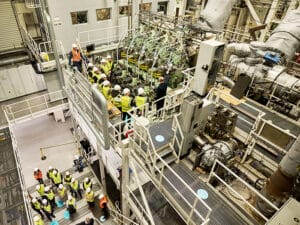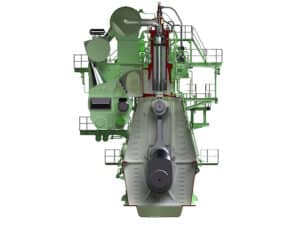
Hybrid propulsion adoption on the rise
Written by
Crowley Engineering partnered with Regal Rexnord to streamline the propulsion system of the Casco Bay Lines electric passenger ferry, serving Portland, Maine. (Credit: Elliot Bay Design Group & Casco Bay Lines)
By Jake Swihart, Global Industry Marketing Manager – Marine
The maritime industry is under increasing pressure to reduce greenhouse gas emissions, and hybrid propulsion systems are emerging as one of the leading solutions for vessel operators balancing performance with stricter environmental regulations.
Hybrid Propulsion: A Balanced Approach
Hybrid propulsion systems provide a balanced approach to reducing emissions and improving fuel efficiency, with the added benefit of meeting constantly evolving regulations. Integrating electric motors with traditional internal combustion engines allows vessels to operate more efficiently and with a lower environmental impact. However, the transition to hybrid systems presents unique technical challenges, particularly in managing the complex dynamics of torsional vibrations within the drivetrain.
Globally, the average vessel age is between 17 and 22 years, causing many operators to consider either re-powering their vessel with a modern powertrain that meets regional regulations, such as CARB, EPA Tier 4 Final, EU Stage V, or IMO III global emission standards, or retiring and replacing the vessel with a new, modern vessel.
Experts say that integrating electric power into existing designs requires careful planning. Naval architects and propulsion engineers recommend early collaboration among owners, designers, and component suppliers. Early engagement also facilitates seamless integration of components, ensuring that all systems work harmoniously together. This approach not only reduces costs but also enhances the overall quality and functionality of the vessel, leading to a more successful project execution.
Recent hybrid projects in the United States illustrate both the opportunities and challenges. Casco Bay Lines in Portland, Maine, for example, is preparing to introduce the country’s first all-electric passenger ferry. The project, which brought together multiple engineering and propulsion partners, aimed to optimize space within the vessel, reduce component complexity, and ensure the system meets technical requirements for an emissions-free vessel.

The hybrid and electric transition is also driving research into drivetrain dynamics. Torsional vibration, which becomes more complex as hybrid systems combine different power sources, requires specialized analysis and mitigation strategies to ensure long-term reliability.
Industry suppliers, including Regal Rexnord, say the lessons learned from projects like Casco Bay’s ferry can help inform future designs. The company provided packaged propulsion components for that vessel, working alongside Crowley Engineering and Elliot Bay Design Group to integrate the electric drivetrain.
Projects like these point to a broader trend: as operators face rising costs and new environmental expectations, hybrid solutions are gaining momentum across a range of vessel types, from ferries to offshore tugs. While there is no single route to decarbonization, hybridization is emerging as a practical step for operators who need reliable power while lowering emissions.
As the marine industry navigates the transition to hybrid propulsion systems, it is important that the industry is updated on the current advancements hitting the market today. Advancements in propulsion systems, powertrain solutions, and smart monitoring systems are some of the few ways companies continue to push the industry towards a future that is more sustainable for marine operations. By incorporating these technologies into vessel operations, the maritime industry is safeguarding against future regulations and setting a new standard in what it means to be a successful operation moving forward.




